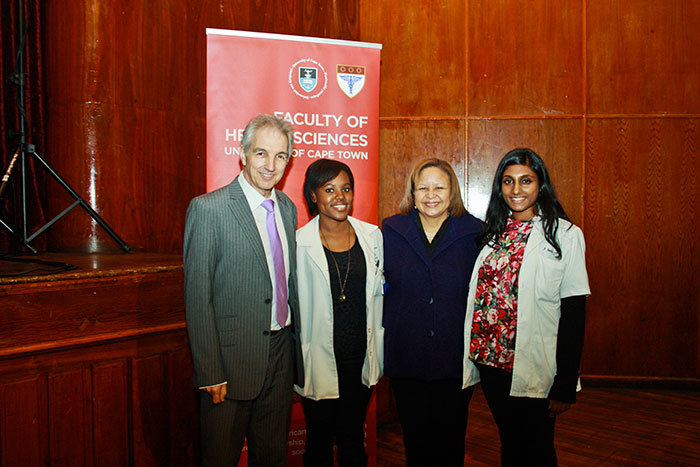UCT initiative tackles healthcare worker shortage in Southern Cape
09 June 2015 | Story by Newsroom
Responding to the urgent national call to increase the numbers of doctors in our country, particularly in rural areas, the Faculty of Health Sciences has joined forces with the Western Cape Department of Health – this time to launch the 'UCT in Eden' initiative. This partnership will see hospitals and community health centres in the greater Southern Cape acting as teaching platforms for UCT final-year health sciences students.
At the recent launch of 'UCT in Eden' at the George Civic Centre, Vice-Chancellor Dr Max Price called Eden an ideal region for the project. "By stretching out and working in hospitals in more rural districts, like the George hospital, we can do two things at once: We can increase capacity to train doctors and rehab therapists – and we can improve the quality of service. We bring in specialists, experts and the professors."
This exciting collaboration between UCT and the Department of Health aims, by 2016, to see 20 medical students spending their penultimate year in the district as student interns, gaining hands-on experience with clinical teams and contributing to service delivery, said Price. By 2018 it is hoped there will be at least 40 students participating in the initiative. Price also said that the programme provided an excellent opportunity for the university to expand; given a shortage of space in the local hospital environment in Cape Town, the medical school has not been able to grow up until this point.
Price added that UCT is focusing on other educational skills to further equip the region. "The teaching in rural schools, especially maths and science and even English, is really lacking. One of the things we want to do is to see how we can use new technologies to improve service. So the teaching project involves installing broadband, computers, and tablets for pupils in 12 schools that we have identified. But the most important thing is to train the teachers how to use the technologies." UCT is already involved in psychology and HIV/AIDS programmes in the region.
An invaluable opportunity
During the launch, Price introduced a few of the UCT medical students who have already worked in the region in smaller groups for a few weeks at a time, including Victoria Parker, Aniefiok Edem and Priyanka Naidu.
Naidu told the audience it had been a privilege to work alongside the doctors and nursing staff at the Oudtshoorn hospital. "Mahatma Gandhi once said: 'The only way to find yourself is to lose yourself in the service of others'. And that is exactly what this experience in Oudtshoorn has taught us – motivating us to be the kind of doctors that our patients look up to, who are the protectors of society, who never complain about the amount of work they have or patients that won't listen," she said.
"I have always believed that South Africa has a unique healthcare problem, to which we need a uniquely South African solution. And it's incredible to bear witness to a public health system that South Africa can be proud of and a curriculum that UCT can be proud of."
The future of the Eden initiative
Professor Gregory Hussey, Faculty of Health Sciences' interim dean, emphasised that this long-term project aims to serve both UCT's medical interns and the local communities. "Students will be integrally involved in service delivery, supported by visiting consultants from Cape Town; staff at the hospitals involved will benefit from professional development offered to UCT staff; and other services and faculties at UCT could be accessible through a permanent presence in the Eden district.
"Our aim is to continue to produce competent students who are well equipped to deal with the health challenges of the South African population," Hussey explained.
Future plans for the initiative include the introduction of a similar model for UCT's Health and Rehabilitation students (occupational therapy, physiotherapy, speech therapy and audiology) in the Eden district, to broaden the scope of exposure to students from other health science programmes.
Story by Carla Calitz. Photo supplied.
 This work is licensed under a Creative Commons Attribution-NoDerivatives 4.0 International License.
This work is licensed under a Creative Commons Attribution-NoDerivatives 4.0 International License.
Please view the republishing articles page for more information.










